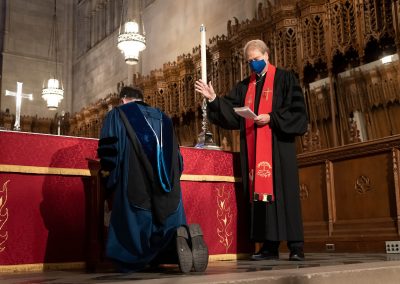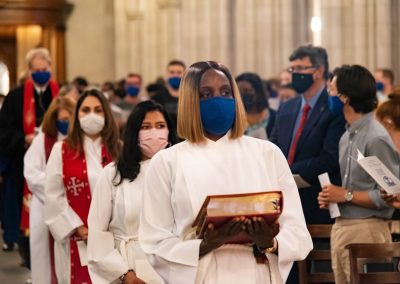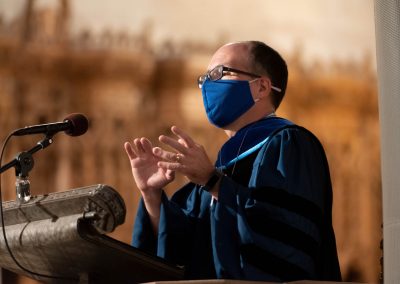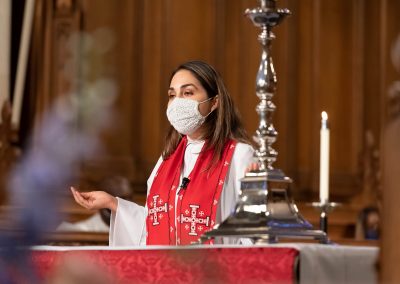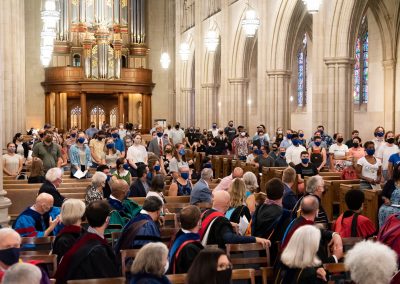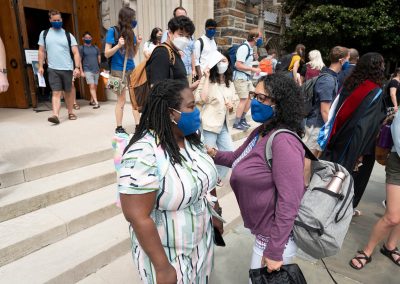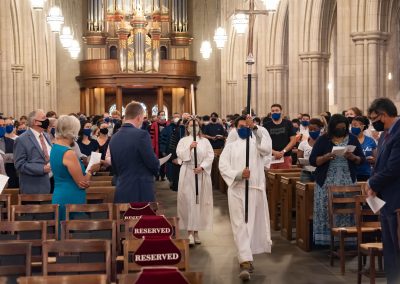Edgardo Colón-Emeric Installed as Dean of Divinity School
Colón-Emeric was installed as the 16th dean of the Divinity School by Duke University Provost Sally KornbluthEdgardo Colón-Emeric Installed as Dean of Divinity School
Colón-Emeric was installed as the 16th dean of the Divinity School by Duke University Provost Sally Kornbluth
In an Opening Convocation service that reflected on the place and purpose of the Divinity School within Duke University and in the world, Edgardo Colón-Emeric was installed as the 16th dean of the Divinity School by Duke University Provost Sally Kornbluth on August 31 in Duke University Chapel.
“The Divinity School is the embodiment of the original intention of the university to fulfill its calling in the preparation of a learned ministry,” said Kornbluth. “It is also the symbol of the long and abiding relationship between church and academy. Today, we affirm anew that relationship, symbolized in the motto Eruditio et Religio, as we install a dean of the Divinity School.”
Colón-Emeric, the Irene and William McCutchen Associate Professor of Theology and Reconciliation and director of the Center for Reconciliation, began his two-year term as the dean of Duke Divinity School on July 1 this year. He is the first Latino dean of the school.
The Divinity School is the embodiment of the original intention of the university to fulfill its calling in the preparation of a learned ministry. It is also the symbol of the long and abiding relationship between church and academy. Today, we affirm anew that relationship, symbolized in the motto Eruditio et Religio, as we install a dean of the Divinity School.
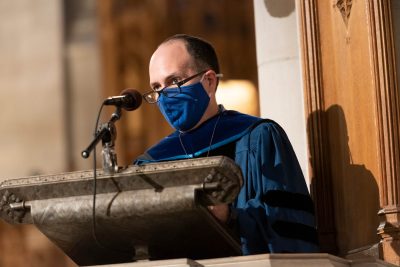
Dean Colón-Emeric gives the sermon during the service.
The school’s 95th Opening Convocation, the first worship service of the academic year, also included a blessing of new faculty and staff and a welcome to the entering class of students, the largest class in the history of the school.
“We begin a new academic year at a very dense moment in history,” said Colón-Emeric in his sermon to students, faculty, staff, alumni, and other friends of the school. “The masks tell only part of the tale. We are still in the age of pandemic, in the seemingly unending time between pre-COVID and increasingly moving forward post-COVID. […] This morning, I want us to consider this basic fact: Our service, our convocation and installation, our academic year are happening in the season after Pentecost, but the Holy Spirit is not finished with us yet.”
“A new Pentecost is possible at Duke Divinity. What does this mean? It means opening our minds and hearts to a new visitation of the Spirit. It means going back to that Pentecost window at the top of the Westbrook Building in the Divinity School and seeing our community in the image that is presented there. It means that the Holy Spirit is not yet done with us.”
— Dean Colón-Emeric
Calling for the school to be firm in its commitment to cultivate a Pentecost vision of God, the world, and the church—a vision in which the Holy Spirit brings understanding into a confused world—Colón-Emeric charged the community to engage in practices such as close reading and analytical thinking that contribute to this vision, while keeping in mind that theology is also practiced on the street level, among the movement of the people. “Trickle-down academics will not work,” he said.
“A new Pentecost is possible at Duke Divinity,” he said. “What does this mean? It means opening our minds and hearts to a new visitation of the Spirit. It means going back to that Pentecost window at the top of the Westbrook Building in the Divinity School and seeing our community in the image that is presented there. It means that the Holy Spirit is not yet done with us.
“Faculty and staff, it can happen. We only need to raise our students high, because our students are our sails, the sails which are very sensitive to the blowing of the Holy Spirit coming from marginalized communities.
“Students, for you to be the sails, allow yourself to be stretched and to be filled with the fullness of God. A new Pentecost is urgent, is possible, and it is promised.”
Read the text of Dean Colón-Emeric’s Opening Convocation Homily (PDF).
Professor Alma Tinoco Ruiz, director of the Hispanic House of Studies, gives a blessing during the service.
Watch the service (captions also available in Spanish and Korean).
Colón-Emeric earned both his M.Div. and Ph.D. from Duke, and has served on the faculty since 2008. His scholarship covers a broad range of theological areas, including systematics, Wesleyan theology, ecumenism, and Latin American theology. Both his academic research and his ministry experience explore the intersection of Methodist and Catholic theologies, and Wesleyan and Latin American experiences. His most recent book is Óscar Romero’s Theological Vision: Liberation and the Transfiguration of the Poor (Notre Dame University Press).
Colón-Emeric is an ordained elder in the North Carolina Annual Conference of the United Methodist Church. He directs the Central American Methodist Course of Study and the Peru Theological Initiative and serves in the United Methodist Committee on Faith and Order and on both national and international Methodist-Catholic dialogues.
